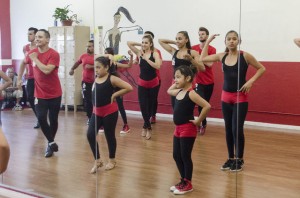When Maria Diaz auditioned for the UCLA world arts and cultures’ dance program, she never had any formal dance training.
Now the alumna runs her own studio and hopes to provide young people with opportunities she didn’t have as a child.
Diaz is a co-director and instructor at Fuego y Sabor Latino Dance Studio, which opened a location in South Central Los Angeles in 2016. The company, originally founded by Mike Diaz in Colombia in 2014, aims to provide students with an outlet for exercise and artistic expression, she said. The studio performed at its first international competition in July 2016 at the Las Vegas Salsa and Bachata Congress.

Maria Diaz said she first began dancing in her hometown of Soacha, Colombia. After moving to the U.S. when she was nine, she continued to dance and watch her older sister, who also loved to dance. After she enrolled at UCLA as a pre-med student, she would often teach salsa and bachata classes at the John Wooden Center. Later, Maria Diaz became a dance and biology student after she was accepted into the world arts and cultures program.
Maria Diaz helped reopen FSL after meeting fellow Colombians Mike Diaz and Cesar Hernandez at an LA Latin American dance competition in 2014, she said. The three discussed bringing their home country’s passion for dance to South Central LA.
“Dance in Colombia is not a culture, it’s a lifestyle,” Hernandez said. “People who have the passion for dance sleep with it, live with it and absolutely involve themselves in it.”
Maria Diaz said the underserved community of South Central LA reminded the three co-directors of their native country. Both areas have a reputation for crime and poverty, she said, and many driven individuals who live in these places are often overlooked.
“It is because of the community back home that got us into dancing that really pushed us to where we are now,” Diaz said. “So we kind of wanted to become a place where these people and communities could find a way out through art and movements.”
UCLA world arts and cultures professor and Maria Diaz’s former instructor Victoria Marks said that while many young dancers aspire to teach, it’s rare for them to have the sense of purpose that Maria Diaz and her fellow co-directors have shown.
“It’s really powerful when you come from a community and you bring back what you’ve learned. You’re an insider,” Marks said. “You’re not setting up ‘Little Joe So and So’s Dancing School’ because you know how the systems work.”
FSL incorporates the co-directors’ native dance styles by offering training in Colombian salsa. The style is rarely taught in the U.S., Hernandez said, and it incorporates dance steps distinct to the culture.
Hernandez said trying to get students interested in Colombia’s dances can often feel like an overwhelming responsibility. While people in the local Latin dance community may have seen Colombian salsa in competitions, he said it has still not caught on in LA.
Students training in Colombian salsa are often trying to gain experience for the competitive teams, but Maria Diaz said many individuals go to FSL hoping to lose weight or simply to find a new hobby.
For those students who dream of making a career out of dance, the co-directors try to be encouraging, Maria Diaz said.
“A lot of people think that with dance you can’t make a living, but if you do things right, especially if you start your own business, there’s no reason you couldn’t live off this,” she said.
For paid gigs like El Festival Colombiano at the Pico Rivera Sports Arena, even the youngest company performers receive part of the earnings. She said by rewarding young students for their dedication, FSL teaches them that hard work does pay off.
“With the kids who really, really like dancing, we want to show them that if they love to dance and are as good as they are, then they could make a life out of this,” Maria Diaz said. “It doesn’t just have to be a hobby, and they don’t have to be looked down upon.”
While FSL’s co-directors spent much of the past year planning their new business and trying to attract new students, in recent months their company has been making more appearances at events like Palm Springs Salsa Extravaganza. Maria Diaz said the events are opportunities to see the hard work of both the students and co-directors pay off.
“For many dancers who are poor and don’t have anything, dancing is their only dream,” Hernandez said.
